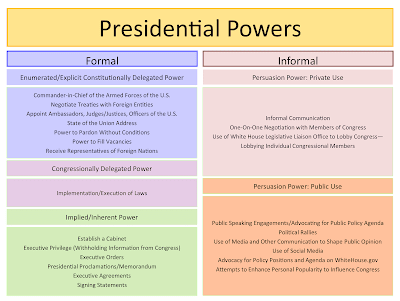Foucault and Language
"Power is Everywhere"
A Discussion of Michel Foucault's Concept of Power
What is power? This is a big question that Michel Foucault argues. How does one get power, what does it look like, and how does it affect others. If you were to ask me to describe what power is prior to reading about Foucault's concept, I would have told you that power is the idea that one has control over another. However, Foucault shows that there is more to power than "control". Through this blog, I will discuss what most people believe is power, while further explaining what true power is, according to Foucault.
Repressive Power
When discussing power, most individuals think of political power. In fact, I tend to think of political power. Other forms of power that come to mind are powers in workplaces, school systems, law enforcement, or even in a home environment. No matter what system you think of, the power tends to come from someone who is "above" you and has control over you. For a lot of people, this power creates negative feelings. This paragraph is in no way to discuss political matters and try to sway you to one side or another, but rather to look at the power that politicians have. The picture to the left describes what powers presidents naturally have. In discussing political power, I am not trying to say that politics are bad or good. I simply do not have enough knowledge to make an argument. However, through reading articles and learning about Foucault's discussion over power, I can say that repressive power has negative connotations. While not completely made up of repressive power, there are aspects of the political and hierarchical nature that can be repressive. Repressive power means that one uses their power to control and decide what others do. Within repressive power, there is a sort of "fear" based tactic that is used. Through reading an article by Nasrullah Mambrol, it was found that one common model of power is the juridical-discursive model. This model emphasizes the "conception of power" and it is essentially "juridical based on the statement of the law and taboo, and is seen as straightforwardly restrictive and repressive" (Mambrol). This tactic is seen through many different institutions, and it is harmful, according to Foucault. In my own opinion, I do believe that this negative use of power can be harmful as it tends to put fear into those the power is being executed. However, I do believe that we cannot have a functioning society without some power, and this is where normative power comes into play.
 With all this said and done, I did read another article that explained how there are more important viewpoints of normative powers. For example, it is much more important that normative powers make sure we don't kill people. According to Joseph Raz, this is called "directing powers" which "are derivative powers" that have an emphasis on "what matters normatively in the first place", such as the facts that "people should not be killed" and "taxes should be paid" (Raz, p.6). This conversation is important as it discusses morals. While normative powers is beneficial to our society, we should understand morals, and what expectations are more important.
With all this said and done, I did read another article that explained how there are more important viewpoints of normative powers. For example, it is much more important that normative powers make sure we don't kill people. According to Joseph Raz, this is called "directing powers" which "are derivative powers" that have an emphasis on "what matters normatively in the first place", such as the facts that "people should not be killed" and "taxes should be paid" (Raz, p.6). This conversation is important as it discusses morals. While normative powers is beneficial to our society, we should understand morals, and what expectations are more important.External Forces: Introduction to business. Course Sidekick. (n.d.). https://www.coursesidekick.com/business/study-guides/wmopen-introductiontobusiness/external-forces-that-shape-business-activities
Mambrol, N. (2020, May 15). Foucault’s concept of power. Literary Theory and Criticism. https://literariness.org/2016/04/05/foucaults-concept-of-power/
Mind, ~ A Pondering. (2018, June 25). Quote-schools-serve-the-same-social-functions-as-prisons-and-mental-institutions-to-define-michel-foucault-120-5-0517. A Pondering Mind. https://aponderingmind.org/2018/06/25/schools/quote-schools-serve-the-same-social-functions-as-prisons-and-mental-institutions-to-define-michel-foucault-120-5-0517/
Normative Powers (revised). (n.d.). https://scholarship.law.columbia.edu/cgi/viewcontent.cgi?article=3464&context=faculty_scholarship
The president: Upholding, implementing, and enforcing the law: United States Government. collegesidekick. (n.d.). https://www.collegesidekick.com/study-guides/americangovernment/the-design-and-evolution-of-the-presidency



Hi Lauren! This is Maddie from class, just wanted to say hi and that I enjoyed reading your understanding of Normative power.
ReplyDelete